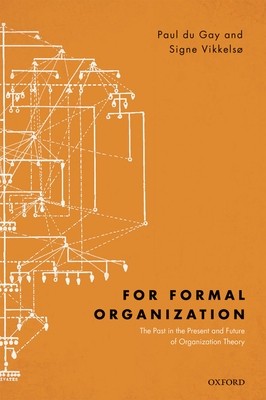
- We will send in 10–14 business days.
- Author: Paul du Gay
- Publisher: Oxford University Press, USA
- ISBN-10: 0198705123
- ISBN-13: 9780198705123
- Format: 15.2 x 23.6 x 1.5 cm, hardcover
- Language: English
- SAVE -10% with code: EXTRA
Reviews
Description
This book focuses on the state of Organization Theory, its purpose, object, and practical relevance. In recent years, disquiet has mounted within the field of organizational analysis, broadly defined, about the overly theoretical and a-or anti-organizational state of Organization Theory and its consequent lack of practical purchase, not least in the light of pressing economic, social and political concerns that are often profoundly organizational in nature.
The book argues that predominant contemporary modes of theorising within the field, and in particular the stance associated with them, have had the effect of occluding and dissolving Organization Theory's core object - formal organization - and, as a consequence, dissipating its practical focus and reach. The book seeks to contribute to the goal of reviving Organization Theory as a practical science of organizing and rehabilitating its core object -formal organization - through a re-examination and re-assessment of the outlook, comportment and attitude - stance - animating its classical antecedents. This ambition is double edged. For not only does it seek to revive Organization Theory through reconnecting it with the practical orientation framing classical organizational analysis, it also seeks to indicate how the historic products of that orientation or stance still have considerable traction for analysing and intervening in contemporary matters of organizational concern. Not least,this 'classical organizational stance' provides those who adopt it with a method with which to orient themselves both in formal organizational thought and in formal organizational life. It furnishes them with an ethos combining both practical rationality and ethical seriousness. In this sense the book suggest itself both as a guide to doing Organizational analysis and doing practical organization
EXTRA 10 % discount with code: EXTRA
The promotion ends in 19d.01:29:52
The discount code is valid when purchasing from 10 €. Discounts do not stack.
- Author: Paul du Gay
- Publisher: Oxford University Press, USA
- ISBN-10: 0198705123
- ISBN-13: 9780198705123
- Format: 15.2 x 23.6 x 1.5 cm, hardcover
- Language: English English
This book focuses on the state of Organization Theory, its purpose, object, and practical relevance. In recent years, disquiet has mounted within the field of organizational analysis, broadly defined, about the overly theoretical and a-or anti-organizational state of Organization Theory and its consequent lack of practical purchase, not least in the light of pressing economic, social and political concerns that are often profoundly organizational in nature.
The book argues that predominant contemporary modes of theorising within the field, and in particular the stance associated with them, have had the effect of occluding and dissolving Organization Theory's core object - formal organization - and, as a consequence, dissipating its practical focus and reach. The book seeks to contribute to the goal of reviving Organization Theory as a practical science of organizing and rehabilitating its core object -formal organization - through a re-examination and re-assessment of the outlook, comportment and attitude - stance - animating its classical antecedents. This ambition is double edged. For not only does it seek to revive Organization Theory through reconnecting it with the practical orientation framing classical organizational analysis, it also seeks to indicate how the historic products of that orientation or stance still have considerable traction for analysing and intervening in contemporary matters of organizational concern. Not least,this 'classical organizational stance' provides those who adopt it with a method with which to orient themselves both in formal organizational thought and in formal organizational life. It furnishes them with an ethos combining both practical rationality and ethical seriousness. In this sense the book suggest itself both as a guide to doing Organizational analysis and doing practical organization


Reviews